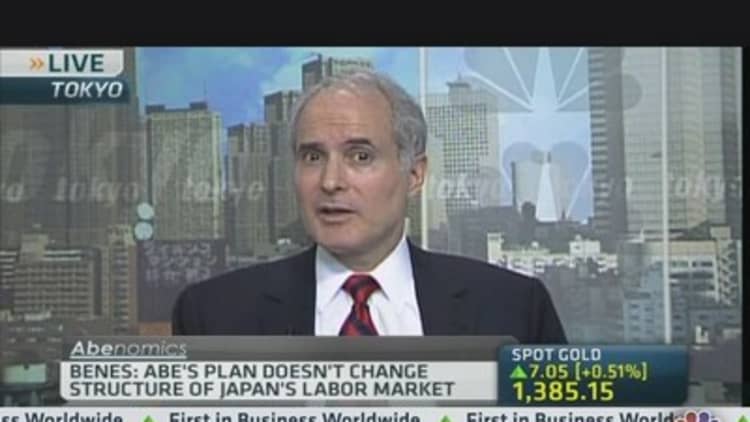The yen strengthened to a 10-week high against the U.S. dollar on Thursday, as heightened concerns about the Federal Reserve tapering its expansive asset buying program brought the safe haven trade back into play.
The yen has been on a weakening trend since mid-September, falling around 31 percent to reach the psychologically important level of 100 against the U.S. dollar in mid-May. However, over the past month the trend has appeared to reverse, and the yen has strengthened around 8.5 percent. On Thursday the yen rallied more than 2 percent against the greenback to around 94.
Keagan York, head of forex strategy at Sydney based trading firm Compass Global Markets, said investors were viewing the yen as a safe haven trade again.
"People buying the yen is a bi-product of people selling riskier assets and seeing the yen as a safe haven again," he said.
Markets worldwide sold off this week as investors fretted over whether or not the Fed would soon call time on its expansive bond buying program.
The Nikkei 225 fell near 21 percent from last month's five and a half year high of 15,942, while the Dow Jones logged its first three-day decline this year on Wednesday.
(Read More: Is It Game Over for Japanese Equities?)
Asian investors have been panicking over how the end of quantitative easing (QE) in the U.S. will impact equity markets worldwide.
York added that these concerns were the primary reason for the yen strength.
"This [recent strength in the yen] is a shake-out of expectations that the end of QE will affect more of Asia than originally expected," he said.
(Read More: Here's How QE Tapering Could Hurt Asia)

Other analysts said strength in the yen had been driven by a combination of heightened risk aversion, together with recent disappointment in Japanese economic policy progress.
"Investors are unwilling to short the yen when there is a lack of follow-through on policy promises, and at the same time, high risk aversion," said Mitul Kotecha, head of foreign exchange strategy at Credit Agricole.
(Read More: Major Structural Reforms in Japan Unlikely, Says Mr Yen)
Prime Minister Shinzo Abe's failure to announce ground-breaking structural reforms at his speech last week, alongside the Bank of Japan's inaction in addressing swings in the government bond market at its last policy meeting, have led to concerns over whether "Abenomics" can deliver on its promise of reviving growth.
"I expect this move [higher in the yen] to persist for at least a few weeks, but it's not a multi-month move," said Kotecha.
Paul Mackel, head of Asian forex Research at HSBC, said the yen could further strengthen to 93 against the dollar in the coming weeks, but said he was sticking to his long-term forecast of 99 against the dollar by the end of the year.
(Read More: Should the Bank of Japan Have Done More?)


